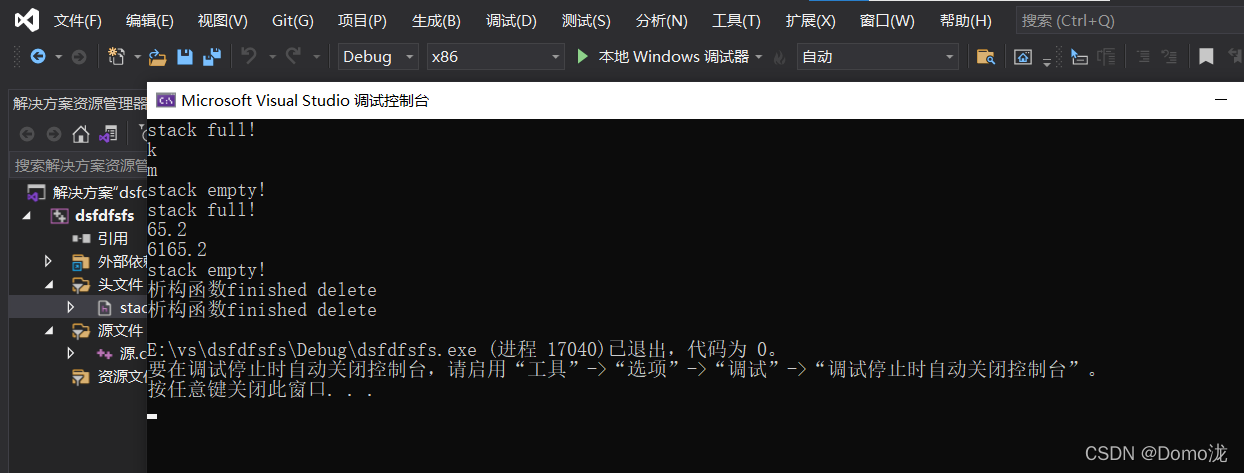1.类
const int MAX_SIZE = 100;
template <class DataType>
class stack
{
private:
DataType* data;//属性:线性表!
int size;//堆栈实际大小
int top;//栈顶
//函数类外表示
public:
stack();//默认构造函数
stack(int s);//有参构造函数
~stack();//析构函数
void push(DataType ch);//入栈
DataType pop();//出栈并返回栈顶元素
DataType getTop();//获得栈顶元素但不出栈
bool isEmpty();//判断栈是否为空
bool isFull();//判断栈是否满
void setNull();//设置栈为空!!!!
//捕捉异常需要设定内部类!!!!!
class Full {};
class Empty {};//注意是花括号!!!
};
2.类外实现函数接口
1.无参构造函数
//无参构造函数
stack<DataType>::stack()
{
size = MAX_SIZE;
top = -1;
data = new DataType[MAX_SIZE];
}
2.有参构造函数
//有参构造函数
template <class DataType>
stack<DataType>::stack(int s) {
size = s;
top = -1;
data = new DataType[size];
}
3.//析构函数,释放堆区数据
//析构函数,释放堆区数据
template <class DataType>
stack<DataType>::~stack()
{
delete []data;//内存回收 释放new创建data占用的内存
cout << "析构函数finished delete\n";
}
4.//入栈操作
//入栈操作
template <class DataType>
void stack<DataType>::push(DataType ch) {
if (isFull())
throw stack<DataType>::Full();//若栈已满,再进行入栈操作,则抛出异常
else
data[++top] = ch;
//return true;
}
5.//出栈操作
//出栈操作
template <class DataType>
DataType stack<DataType>::pop() {
if (isEmpty())
throw stack<DataType>::Empty();//若栈为空,再进行出栈操作,则抛出异常
else
return data[top--];
}
6.//得到栈顶元素
//得到栈顶元素
template <class DataType>
DataType stack<DataType>::getTop()
{
if (!isEmpty())
return data[top];
}
7.//判断栈是否为空
//判断栈是否为空
template <class DataType>
bool stack<DataType>::isEmpty()
{
if (top == -1) {
return true;
}
else {
return false;
}
}
8.//判断栈是否满了
//判断栈是否满了
template <class DataType>
bool stack<DataType>::isFull() {
if (top == size - 1) {
return true;
}
else {
return false;
}
}
9.//设置栈为空!!!!
//设置栈为空!!!!
template <class DataType>
void stack<DataType>::setNull() {
top = -1;
cout << "top=-1!\n";
}
3.stack.cpp
#include "stack.hpp"
#include <iostream>
using namespace std;
int main() {
stack<char> st(2);
//stack<char> st(2);//利用两者均可构造函数初始化
char ch;
try {
st.push('a');
st.push('b');
st.push('c');
}
catch (stack<char>::Full) {//注意!!!此处FULL后面不需要括号!!!!!
cout << "stack full!\n";
}
try {
ch = st.pop();
cout << ch << endl;
ch = st.pop();
cout << ch << endl;
ch = st.pop();
cout << ch << endl;
}
catch (stack<char>::Empty) //若栈为空,再进行出栈操作,则抛出异常
{
cout << "stack empty!\n";
}
double c;
stack<double> sl(2);
try {
sl.push(1998.3);
sl.push(1999.9);
sl.push(2000.1);
}
catch (stack<double>::Full) {//注意!!!此处FULL后面不需要括号!!!!!
cout << "stack full!\n";
}
try {
c = sl.pop();
cout << c << endl;
c = sl.pop();
cout << c << endl;
c = sl.pop();
cout << c << endl;
}
catch (stack<double>::Empty) {
cout << "stack empty!\n";
}
return 0;
}
4.总源码(分文件)
1.stack.hpp
#pragma once
const int MAX_SIZE = 100;
template <class DataType>
class stack
{
private:
DataType* data;//属性:线性表!
int size;//堆栈实际大小
int top;//栈顶
//函数类外表示
public:
stack();//默认构造函数
stack(int s);//有参构造函数
~stack();//析构函数
void push(DataType ch);//入栈
DataType pop();//出栈并返回栈顶元素
DataType getTop();//获得栈顶元素但不出栈
bool isEmpty();//判断栈是否为空
bool isFull();//判断栈是否满
void setNull();//设置栈为空!!!!
//捕捉异常需要设定内部类!!!!!
class Full {};
class Empty {};//注意是花括号!!!
};
//#endif
#include <iostream>
using namespace std;
template <class DataType>
//无参构造函数
stack<DataType>::stack()
{
size = MAX_SIZE;
top = -1;
data = new DataType[MAX_SIZE];
}
//有参构造函数
template <class DataType>
stack<DataType>::stack(int s) {
size = s;
top = -1;
data = new DataType[size];
}
//析构函数,释放堆区数据
template <class DataType>
stack<DataType>::~stack()
{
delete []data;//内存回收 释放new创建data占用的内存
cout << "析构函数finished delete\n";
}
//入栈操作
template <class DataType>
void stack<DataType>::push(DataType ch) {
if (isFull())
throw stack<DataType>::Full();//若栈已满,再进行入栈操作,则抛出异常
else
data[++top] = ch;
//return true;
}
//出栈操作
template <class DataType>
DataType stack<DataType>::pop() {
if (isEmpty())
throw stack<DataType>::Empty();//若栈为空,再进行出栈操作,则抛出异常
else
return data[top--];
}
//得到栈顶元素
template <class DataType>
DataType stack<DataType>::getTop()
{
if (!isEmpty())
return data[top];
}
//判断栈是否为空
template <class DataType>
bool stack<DataType>::isEmpty()
{
if (top == -1) {
return true;
}
else {
return false;
}
}
//判断栈是否满了
template <class DataType>
bool stack<DataType>::isFull() {
if (top == size - 1) {
return true;
}
else {
return false;
}
}
//设置栈为空!!!!
template <class DataType>
void stack<DataType>::setNull() {
top = -1;
cout << "top=-1!\n";
}
2.stack.cpp
#include "stack.hpp"
#include <iostream>
using namespace std;
int main() {
stack<char> st(2);
//stack<char> st(2);//利用两者均可构造函数初始化
char ch;
try {
st.push('m');
st.push('k');
st.push('v');
}
catch (stack<char>::Full) {//注意!!!此处FULL后面不需要括号!!!!!
cout << "stack full!\n";
}
try {
ch = st.pop();
cout << ch << endl;
ch = st.pop();
cout << ch << endl;
ch = st.pop();
cout << ch << endl;
}
catch (stack<char>::Empty) //若栈为空,再进行出栈操作,则抛出异常
{
cout << "stack empty!\n";
}
double c;
stack<double> sl(2);
try {
sl.push(6165.2);
sl.push(65.2);
sl.push(12.888);
}
catch (stack<double>::Full) {//注意!!!此处FULL后面不需要括号!!!!!
cout << "stack full!\n";
}
try {
c = sl.pop();
cout << c << endl;
c = sl.pop();
cout << c << endl;
c = sl.pop();
cout << c << endl;
}
catch (stack<double>::Empty) {
cout << "stack empty!\n";
}
return 0;
}
5,总源码(单文件)
#include <iostream>
using namespace std;
const int MAX_SIZE = 100;
template <class DataType>
class stack
{
private:
DataType* data;//属性:线性表!
int size;//堆栈实际大小
int top;//栈顶
//函数类外表示
public:
stack();//默认构造函数
stack(int s);//有参构造函数
~stack();//析构函数
void push(DataType ch);//入栈
DataType pop();//出栈并返回栈顶元素
DataType getTop();//获得栈顶元素但不出栈
bool isEmpty();//判断栈是否为空
bool isFull();//判断栈是否满
void setNull();//设置栈为空!!!!
//捕捉异常需要设定内部类!!!!!
class Full {};
class Empty {};//注意是花括号!!!
};
template <class DataType>
//无参构造函数
stack<DataType>::stack()
{
size = MAX_SIZE;
top = -1;
data = new DataType[MAX_SIZE];
}
//有参构造函数
template <class DataType>
stack<DataType>::stack(int s) {
size = s;
top = -1;
data = new DataType[size];
}
//析构函数,释放堆区数据
template <class DataType>
stack<DataType>::~stack()
{
delete[]data;//内存回收 释放new创建data占用的内存
cout << "析构函数finished delete\n";
}
//入栈操作
template <class DataType>
void stack<DataType>::push(DataType ch) {
if (isFull())
throw stack<DataType>::Full();//若栈已满,再进行入栈操作,则抛出异常
else
data[++top] = ch;
//return true;
}
//出栈操作
template <class DataType>
DataType stack<DataType>::pop() {
if (isEmpty())
throw stack<DataType>::Empty();//若栈为空,再进行出栈操作,则抛出异常
else
return data[top--];
}
//得到栈顶元素
template <class DataType>
DataType stack<DataType>::getTop()
{
if (!isEmpty())
return data[top];
}
//判断栈是否为空
template <class DataType>
bool stack<DataType>::isEmpty()
{
if (top == -1) {
return true;
}
else {
return false;
}
}
//判断栈是否满了
template <class DataType>
bool stack<DataType>::isFull() {
if (top == size - 1) {
return true;
}
else {
return false;
}
}
//设置栈为空!!!!
template <class DataType>
void stack<DataType>::setNull() {
top = -1;
cout << "top=-1!\n";
}
int main() {
stack<char> st(2);
//stack<char> st(2);//利用两者均可构造函数初始化
char ch;
try {
st.push('m');
st.push('k');
st.push('v');
}
catch (stack<char>::Full) {//注意!!!此处FULL后面不需要括号!!!!!
cout << "stack full!\n";
}
try {
ch = st.pop();
cout << ch << endl;
ch = st.pop();
cout << ch << endl;
ch = st.pop();
cout << ch << endl;
}
catch (stack<char>::Empty) //若栈为空,再进行出栈操作,则抛出异常
{
cout << "stack empty!\n";
}
double c;
stack<double> sl(2);
try {
sl.push(6165.2);
sl.push(65.2);
sl.push(12.888);
}
catch (stack<double>::Full) {//注意!!!此处FULL后面不需要括号!!!!!
cout << "stack full!\n";
}
try {
c = sl.pop();
cout << c << endl;
c = sl.pop();
cout << c << endl;
c = sl.pop();
cout << c << endl;
}
catch (stack<double>::Empty) {
cout << "stack empty!\n";
}
return 0;
}
测试结果

